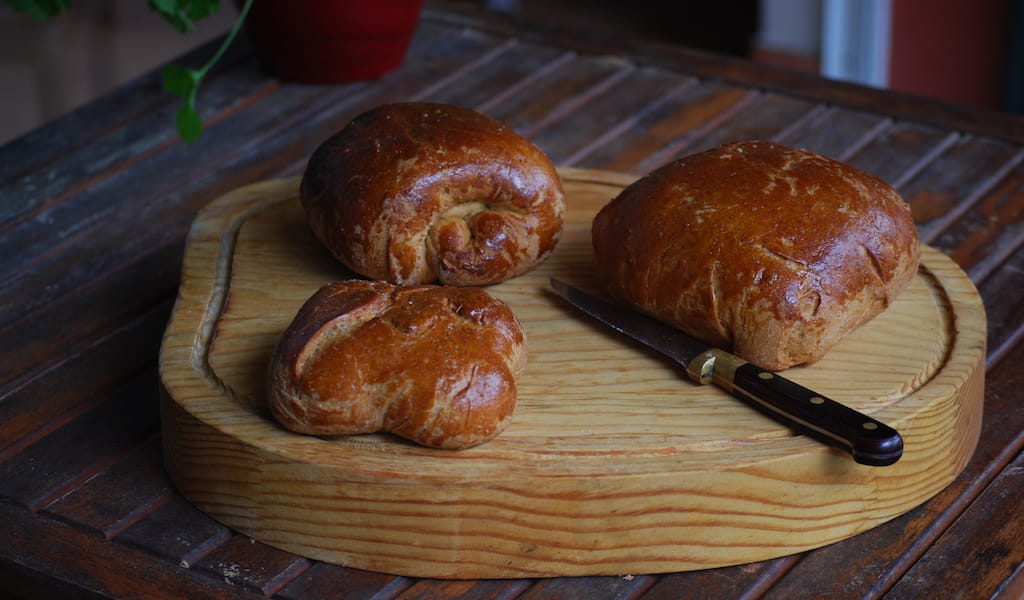A famous Italian saying goes, “Christmas with yours and Easter with whomever you want.” Well, this year there wasn’t much of a choice: Easter was spent at home, with family.
The lockdown in Italy has largely coincided with Lent (the 40 days leading up to Easter, from Ash Wednesday to Holy Saturday). Except that this year, our Lent will not end on Holy Saturday but looks to continue for a long time (at least until May 3). Jesus Christ rose again on Easter Sunday to fly to the heavens, but it would be enough for us to be able to leave the house.
Since I have the habit of always seeing the glass half full, I try to find the positives in staying home during Holy Week. While I can’t participate in the Easter rites common to southern Italy, almost nothing changes from the culinary perspective. As is known, the resurrection of Christ in Naples is celebrated with a table set with every good thing – the fasting and abstinence of Lent ends in a gastronomic explosion.
Staying at home means experiencing the two aspects of Easter differently, the care of the soul and that of the stomach. So let’s see how Easter is celebrated under quarantine.
Holy Thursday
The washing of the feet was forbidden this year – it’s an easy way to pass the virus. No one will be able to “visit the sepulchers,” an ancient tradition in southern Italy where different churches set up the “sepulcher” of Christ, which they usually deck out with flowers and other decorations.
The gastronomic rites, however, change little: The Neapolitan tradition of Holy Thursday is to eat mussel soup with the famous freselle. It is a tradition that dates back to the 18th century, when the Bourbon dynasty ruled Naples. His majesty Ferdinand I was invited by his spiritual confessor to eat a “poor dish” during Holy Week, to give an example to the people of moderation, of sobriety in the kitchen because the Catholic Church wanted that – abstinence and fasting – in Lent. Since then all Neapolitans must eat mussels on Holy Thursday!

Holy Friday
All churches throughout southern Italy normally organize the Via Crucis (the Way of Sorrows, also known as the Stations of the Cross), a procession wherein the cross is carried from station to station. But this year the faithful had to give up this Easter tradition.
Yet everyone was still able to prepare the Neapolitan dessert par excellence, the ricotta-based dessert most loved by all Neapolitans: the pastiera. The patisseries are closed, so everyone will have to eat their own home-cooked pastiera. And we abstained from the ritual of exchanging these cakes – it’s better this way, because after all everyone loves only the pastiera made in their own home.
Holy Saturday
Again, there was no mass on Holy Saturday. Nor was it possible to confess, which the Catholic world always does at Easter.
In place of mass and confession, Saturday was dedicated to the preparation of the two rustic Easter cakes: tortano and casatiello. Both pies are savory, but one is very rich (the tortano, with salami, ham, cheeses of all kinds) and the other poor (the casatiello, with only cheese and lard). Both are topped with hard-boiled eggs, a symbol of rebirth.
Easter Sunday
Easter mass? Also canceled, which means the resurrection of Christ was celebrated only gastronomically. From the early morning we were in the kitchen, getting ready for one of the most gargantuan lunches of the year.
The Easter lunch usually features lamb, eggs and artichokes, and we weren’t forgoing any component this year. The poor newborn lambs hoped to get away with it. But the butchers remain open, in spite of the coronavirus, and therefore everything remains the same for the unfortunate kids.
Easter lunch opens with the sacramental fellata, which is a very generous plate of cold cuts and cheeses that is refereed to as the holy dish or blessed dish in Naples. It is so called because on Easter day the head of the family blesses all those present with holy water and then the cold cuts appetizer takes the blessing together with the family. And so it becomes the blessed dish!

Monday in Albis (Easter Monday)
On Easter Monday (also called Monday in Albis), Neapolitans normally go out of town with a picnic basket full of macaroni omelets and the Neapolitan casatiello.
This year, it will be celebrated on the terrace or on the balcony. The macaroni omelet will certainly not be missing, although now perhaps obtained by reusing the pasta left over from the previous days. The trip may have to be in our imaginations (maybe we’ll even visit one of the many museums with virtual tours), but lunch will be very real.
In conclusion, the coronavirus has profoundly changed religious habits in Naples, but the gastronomic habits remain substantially unchanged. Staying home does not mean going without the pleasures of good food. On the contrary, all these extra hours in the day allow us to cook the special Easter dishes that we normally would have bought. And, moreover, we take our time cooking, perhaps even appreciating these dishes more.
And maybe that’s the only good news.
 April 2, 2024 Grandma’s Folar Recipe
April 2, 2024 Grandma’s Folar Recipe
Folar is the generic name given to traditional Easter sweet bread in Portugal. Making it […] Posted in Lisbon April 1, 2024 Pastiera
April 1, 2024 Pastiera
Like the Proustian madeleine, sweets can stir up all kinds of feelings in the minds of […] Posted in Naples April 15, 2022 Springtime Fêtes
April 15, 2022 Springtime Fêtes
Growing up with a Midwestern Protestant mom and a Montreal-born Jewish dad, my family’s […] Posted in Marseille
Published on April 13, 2020
Related stories
April 2, 2024
LisbonFolar is the generic name given to traditional Easter sweet bread in Portugal. Making it from scratch is somewhat of a long process, but being confined due to the coronavirus crisis, we seem to have a bit more time on our hands than expected. My family’s folar recipe is from my grandmother Felismina, who was…
April 1, 2024
NaplesLike the Proustian madeleine, sweets can stir up all kinds of feelings in the minds of those who eat them. In Naples, struffoli (small, round doughnuts glazed with honey) and cassata (sponge cake with ricotta and candied fruit) speak of Christmas, while chiacchiere (sugar-dusted fritters) and sanguinaccio (literally “blood pudding,” but actually made of chocolate)…
April 15, 2022
MarseilleGrowing up with a Midwestern Protestant mom and a Montreal-born Jewish dad, my family’s holidays wove together traditions, much like a braided challah bread. We topped our Christmas tree with the Star of David and served matzo at Easter brunch. More cultural than religious, our celebrations weren’t restricted to one faith or another. What mattered…


















































































